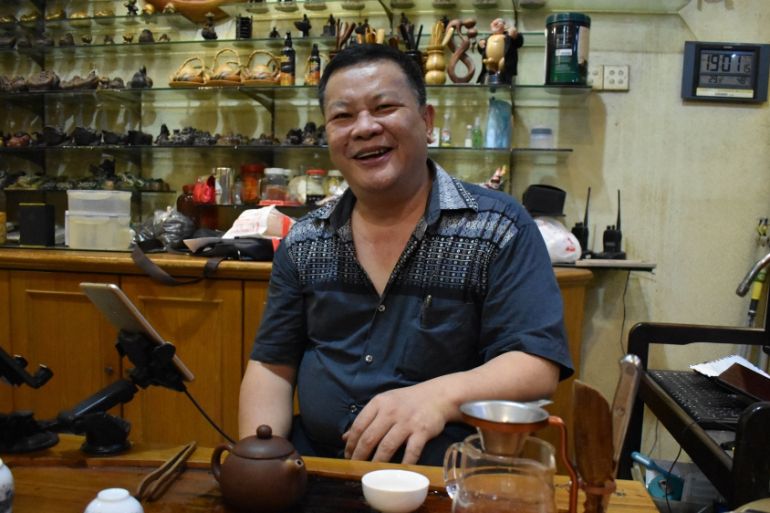Are Chinese-Indonesian voters key to Prabowo’s election win?
The three million Chinese-Indonesians have long faced discrimination in the country.

Medan, Indonesia – In February, presidential hopeful Prabowo Subianto made his first visit to Medan, the provincial capital of North Sumatra and home to one of Indonesia’s largest populations of ethnic Chinese.
Thousands turned out to hear what the former general had to say. While many other Indonesians might be focussed on issues of identity, the ethnic Chinese minority has more pragmatic concerns.
Keep reading
list of 4 items‘No turning back’: Carnation Revolution divides Portugal again, 50 years on
Panama court rules leading candidate Mulino may remain in presidential race
Candidates confront corruption and inequality in Panama’s presidential race
“People are often swayed by religious affiliations or racial ties, but that’s less the case with Chinese-Indonesian voters,” said Endar Hadi Purwanto, who owns a traditional Chinese tea shop in Medan.
“We’re more interested in the goals of the candidates and whether they are really going to work in the best interests of the people.”
According to a 2010 census, there are around three million Chinese-Indonesians in the country. Around six percent of them are in North Sumatra. In Medan, these voters make up 10 percent of the population after the Batak and Javanese.
But the ethnic Chinese community has long faced discrimination in the country.
In the 1960s, anti-communist purges that swept the archipelago as Soeharto wrested power from founding President Sukarno, an estimated 500,000 people died, including thousands of Chinese-Indonesians.
As Soeharto consolidated his position as president, Chinese language schools were banned, as was the celebration of traditional Chinese holidays such as the Lunar New Year. Many ethnic Chinese changed their names to make them sound more Indonesian.
It became a struggle for Chinese to find work in the ranks of the civil service or politics due to racial discrimination. As a result, many became business owners in order to carve out their own livelihoods in Indonesia.
Sitting in his Ho Teh Tiam tea shop, Endar said the experience of the past continues to affect the decisions Indonesia’s ethnic Chinese make today.
“We had to create our own opportunities and our own businesses,” said Endar.
|
|
“[So] infrastructure and growth are big issues for Chinese-Indonesians. We’re interested in candidates who care about efficiency and make things easier for business owners.”
‘Anti-Chinese image’
Brilian Moktar is a member of the Regional House of People’s Representatives (DPRD) for North Sumatra and one of the few Chinese-Indonesians to have broken into politics in the region.
He agreed that Chinese-Indonesian voters were an important voice in North Sumatra, telling Al Jazeera that “we’re one of the largest groups in the province, ahead of say Malay or Minangkabau voters, so our votes certainly count.”
But Moktar also explained that courting this community was not a guarantee to success.
“Prabowo’s been rejected three times [in previous elections] by the majority of Indonesian voters. And Chinese-Indonesian voters are strongly influenced by facts, not identity politics. We vote based on logic,” he said.
For many Chinese-Indonesian voters, Prabowo’s strong nationalistic stance is also likely to deter them from voting for him.
Prabowo was accused of instigating anti-Chinese riots in 1998 when Soeharto was forced from power. They originated in Medan and spread to other parts of the country, leaving more than 1,000 people dead.
Prabowo was discharged from the military in August 1998 but has always denied stirring up racial unrest in the country.
“Prabowo is infamous for his anti-Chinese image,” said Ericssen, an independent political analyst who specialises in Indonesian electoral politics.
Ericssen, who is originally from North Sumatra, added that there were other, more pragmatic reasons why Prabowo may want to reach out to this community.
“Unlike in 2014, when his campaign had strong financial power, this year’s it has been financially challenging for Prabowo,” said Ericssen.
“He launched public fundraising including gala dinners with the Chinese-Indonesian community. Prabowo needs their money and Chinese-Indonesians who are tired of Jokowi’s government will see Prabowo as an alternative.”
‘Money machine’
Yohanes Sulaiman, a political analyst and lecturer at Universitas Jenderal Achmad Yani, agrees.
“As a voting bloc it seems both sides don’t care except seeing Chinese-Indonesians as a money machine,” said Sulaiman.
“Think about it. If they cared about [minority groups like] Christians and Chinese-Indonesians, there’s no way they would have allowed cases like Meiliana’s to happen.”
Meiliana, a Chinese-Indonesian Buddhist from Tanjung Balai in North Sumatra, was sentenced to 18 months in prison for blasphemy in August 2018.
She was blamed for complaining about the volume of the speakers at her local mosque.
Meiliana’s conviction was upheld last week by Indonesia’s highest court, but she told Al Jazeera that she rejected the allegations against her.
“Race and religion shouldn’t be used to create divisions between us,” Meiliana said from prison.
The case inflamed ethnic tensions in North Sumatra after rioters set fire to Buddhist temples in Tanjung Balai, and politicians, including incumbent President Joko Widodo, sought to distance themselves from the case claiming that they could not intervene in the legal process.
In travelling to Medan, Prabowo campaign spokesman, Dahnil Anzar Simanjuntak said the team was recognising the importance of North Sumatra to the political landscape.
Nationally, opinion polls suggest Widodo remains in the lead as election day nears, and many Chinese-Indonesian voters appear unconvinced by Prabowo’s attempt to win their votes this time around.
“In the end, the relationship between Prabowo and Chinese-Indonesian voters is not really about their vote. It is about political branding, political impression and political financing,” said Ericssen.